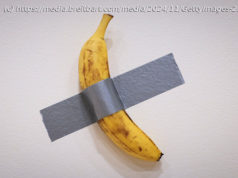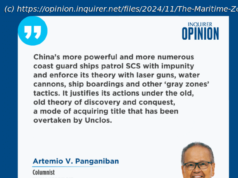From his decision to speak in English to the simplicity of the slides he unveiled, Netanyahu’s presentation appeared to be aimed one specific person: Donald Trump
Israeli Prime Minister Benjamin Netanyahu took the stage in Tel Aviv on Monday to expose what he said was more than a decade of Iranian nuclear deception. Critics said he didn’t reveal anything new. That may never have been the point.
From his decision to speak in English to the simplicity of the slides he unveiled — including one that just said “Iran Lied” — Netanyahu’s presentation appeared to be aimed at an audience of one: Donald Trump. And the U. S. president, who is days away from deciding whether to pull out of the Iran nuclear accord, was listening.
“What’s happening today and what’s happened over the last little while and what we’ve learned has really shown that I’ve been 100 percent right,” Trump told reporters in Washington afterward, saying he watched “a bit” of Netanyahu’s performance.
The Israeli premier theatrically pulled away black curtains to reveal shelves full of binders and compact discs, saying they contained material spirited out of a top-secret location in Tehran, and proved that Iran had pursued a secret plan to build nuclear bombs.
Oil held gains above $68 a barrel as Israel’s accusations stoked speculation Trump may reimpose sanctions on OPEC’s third-biggest oil producer.
The presentation probably didn’t come as a surprise to Trump. The two leaders had spoken over the weekend, just as new Secretary of State Mike Pompeo visited Israel and other key Middle East allies. What it did give Trump was material he can cite as evidence if he decides to take America out of an agreement he’s called the “worst deal ever.”
Late Monday, Pompeo gave one of the clearest signals so far that that’s the president’s intent. “Now that the world knows Iran has lied and is still lying, it is time to revisit the question of whether Iran can be trusted to enrich or control any nuclear material,” the secretary of state said.
Iran has long said its nuclear program was for civilian purposes and that it is committed to never developing atomic weapons. On Twitter, Iranian Foreign Minister Javad Zarif called Netanyahu’s claims “a rehash of old allegations.”
Some analysts agreed — but said they could still serve their purpose.
“It was clear over the course of the address that it really wasn’t intended to make any new charges,” Suzanne Maloney, deputy director of the foreign policy program at the Brookings Institution, said of Netanyahu’s speech. The point “was to underscore the lack of veracity on the part of the Iranian leadership, and that was done very effectively.”
Like Trump, Netanyahu is a vehement critic of the nuclear agreement, reached between Iran, the EU, U. S., Russia, China, Germany, France and the U. K. His presentation suggested that Iran can’t be trusted, even if it’s complying with a deal both men despise.
Europe’s response to Netanyahu was to argue that if you don’t trust someone, that’s all the more reason to keep them where you can see them — in this case, under one of the toughest nuclear-inspection regimes ever imposed.
Those stringent measures were necessary “exactly because there was no trust between the parties,” said the European Union’s foreign minister, Federica Mogherini. It was a message the president also heard, but never publicly endorsed, when hosting French President Emmanuel Macron and German Chancellor Angela Merkel in Washington last week.
“We’ve always known they were lying, that’s why we did what we did,” said Jarrett Blanc, a senior fellow at the Carnegie Endowment for International Peace and a former State Department coordinator for Iran nuclear implementation. “We don’t need them to fess up to everything, we need them to stop doing it.”
While international monitors endorsed by the UN have long insisted that Iran remains in compliance with the agreement, for Trump and his closest advisers, that’s never really mattered. They coined the term “tactical compliance” to reflect their belief that Iran is meeting the terms of the deal in name only while it continues to fund terror groups, destabilize the Middle East and develop ballistic missiles that could carry nuclear warheads.
Netanyahu provided more grist for a skeptical U. S. administration, saying the documents Israel recovered prove that despite its commitment never to pursue a nuclear weapon, Iran was always just biding its time and planned to resume the pursuit of a nuclear weapon when it wanted to.
“The Iran deal is based on lies, it’s based on Iranian lies and Iranian deception,” Netanyahu said. “And in a few days’ time, President Trump will decide, will make a decision on what to do with the nuclear deal. I’m sure he’ll do the right thing.”
Trump’s administration has begun to reveal elements of a broader plan if he does withdraw. Speaking alongside Nigerian President Muhammadu Buhari on Monday, the president said regardless of the outcome on May 12, “that doesn’t mean we won’t negotiate a real agreement.”
Macron laid out one possible scenario when he met with Trump in Washington last week, suggesting supplementary agreements could be reached that would curtail Iran’s nuclear ambitions forever, stop its development of ballistic missiles that could carry such weapons, and constrain its regional influence.






